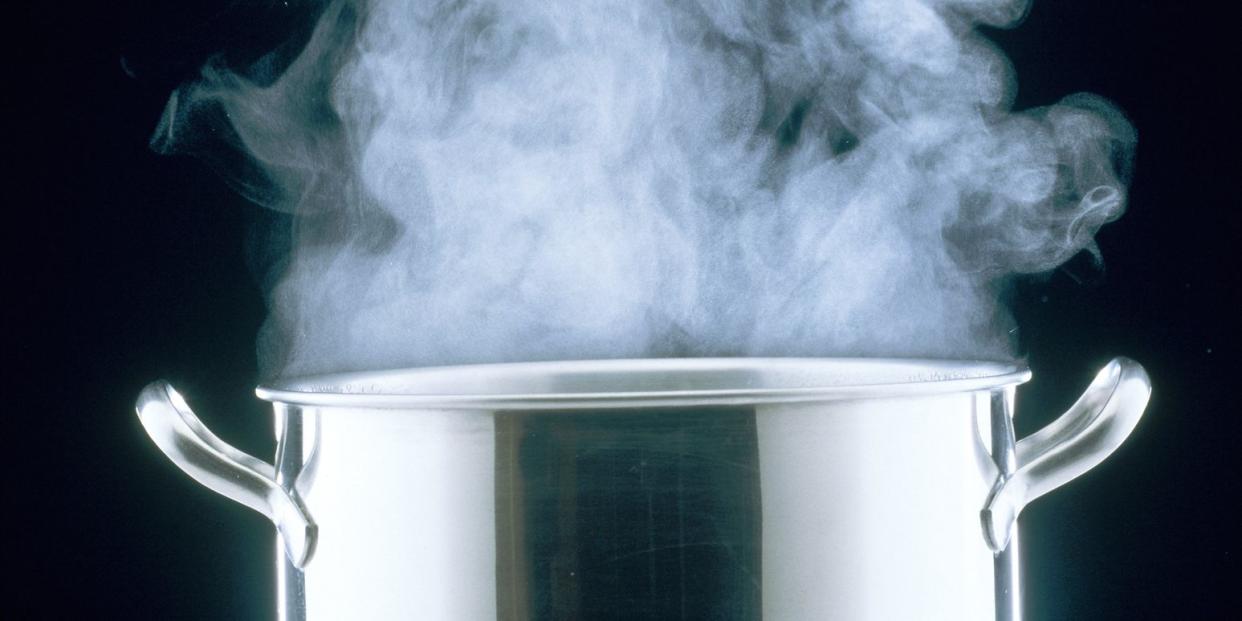If Your Water Is Contaminated, Your Brita Won’t Be Enough. You’ll Have to Boil It.

People in Texas must boil water after a government order in response to frozen pipes.
Boiling water kills waterborne germs by pulling their structures apart with high heat.
You should boil any water before you consume or handle it.
In Texas, record-low temperatures have led to rolling blackouts and carbon monoxide poisoning risks this week. Now, a second grim consequence has come from the unprecedented deep freeze: frozen water infrastructure and a fresh boil water advisory from hundreds of water systems in the Lone Star State.
➡ Join Pop Mech Pro and get exclusive answers to your burning science questions.
There’s a double whammy at work in Texas. The outside temperature is enough to freeze the pipes underground, and electricity has failed for many people and facilities where indoor pipes can also freeze. That means water is exposed to dirt, germs, and more that typically isn’t part of the water circulation infrastructure.
So what does a boil water advisory mean, how does it make water safe to consume again, and what else can you do to make sure your water is clean and safe? Here’s what you need to know.
What Is a Boil Water Advisory?
It’s just what it sounds like: a notice from your water system that says you should boil any water that you plan to drink, cook with, or even clean household surfaces with first before you use it. This also usually includes water you bathe in, unless you can be certain you won’t swallow any of the stuff. Bringing water up to boiling temperature kills almost all the relevant germs that officials might worry about.
You can boil water on the stove, in an electric or even propane kettle, or even over a fire, then store it in clean containers. The water only has to be boiled one time, and then it’s considered safe to use at any temperature as long as you’ve stored it in a clean place.
Why Does Boiling Kill Germs?
Boiling temperatures kill germs by heating pathogens to a point that most of them fall apart and die. Think about what happens to pasta in boiling water: it absorbs all that water and totally changes shape. Boiling germy water denatures proteins and wrecks the structures of pathogens.
Can I Wash My Hands in Unboiled Water?
If your ability to boil water is limited, make sure everyone in your house has enough to drink and use before you worry about washing your hands. You can use hand sanitizer in a pinch, or wash and soap with unboiled water before rinsing with bottled or boiled water.
Is It Safe to Clean With Unboiled Water?
For almost all kinds of cleaning, you should definitely use boiled water, because residual germs could be on surfaces, baby items, pet toys, and more—a.k.a. the stuff you might forget isn’t safe to put in your mouth, or that small children will pick up without thinking.
Is My Brita Filter or Other Filtration System Enough?
Though backup filter systems are great in emergencies (see our favorite recommendations above) they’re not enough—you should still boil all water. It can’t hurt to run the water through your preferred filter afterward, but don’t assume water from a filtration system, especially one that runs directly from your water pipes to your refrigerator, for example, is safe to drink without boiling. If you boil water in a kettle and then pour it through a filtration system, however, that’s considered safe.
You Might Also Like

